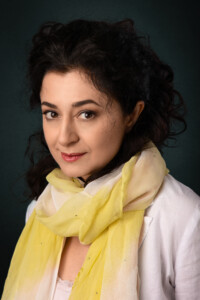Profile of Ece Temelkuran Sian Norris

Share this
‘I don’t know how not to write,’ Turkish novelist, writer and journalist Ece Temelkuran says, the sounds of coffee cups rattling in the background.
‘If I’m sitting down, my spine curves into a question mark as though I am always holding pen and paper. That’s why I’m still writing.’
The two of us are talking on the phone 15 minutes after Lady Hale, the President of the Supreme Court, has called Prime Minister Boris Johnson’s prorogation of Parliament ‘unlawful’.
‘Some good news for your country,’ Temelkuran reacts. ‘But we have to pay attention. We are happy they made this decision, but we are happy for a reason that shouldn’t have been there in the first place.’
Born in Turkey in 1973, Temelkuran wrote her first article when she was 16 and became a full-time reporter three years later. She says ‘I don’t know a life without writing’; that even before she learnt how to write she was ‘imitating letters and doodling the shapes of words’. By the time she was eight years old she was ‘writing rebellious poems against the adults who were not understanding me.’
Her most recent book How To Lose A Country: The Seven Steps From Democracy To Dictatorship explores the erosion of democracy in Turkey and seeks to help other countries avoid a similar fate. Her other non-fiction works include Turkey: The Insane and the Melancholy; Deep Mountain: Across The Turkish-Armenian Divide; and Book Of The Edge. Her novels Women Who Blow On Knots and The Time Of Mute Swans have both been translated into English.
‘I learnt recently that I write novels or poems when my life has taken a dramatic turn. Attention and anger creates my non-fiction. When my heart is broken, such as when I had to leave Turkey, I write fiction.’
The need to pay attention is a theme Temelkuran returns to throughout our conversation. For her, this is a writer’s role in periods of political turmoil.
‘There are two main choices for writers…in these interesting times,’ she insists. ‘The first is to pay attention — to try to understand, to make sense of things, to explain. The other is to retreat. But I think we have to say to ourselves and the world that understanding is impossible without being included in the action. The writer’s job is to pay attention, to be in history and to realise that herself is a political subject as well.’
It’s this paying attention that has made life so dangerous and difficult for writers and intellectuals in Turkey in the last few years. Following the failed coup in 2016, Turkey’s leader Tayyip Erdogan instigated a crackdown against journalists, writers, teachers and academics — forcing people like Temelkuran into exile. Turkey now has more journalists in jail than any other country.
‘Erdogan has been one of the masters of our age when it comes to authoritarianism,’ Temelkuran explains. She compares him to the other bully boy leaders of the moment: Trump, Putin, Johnson, Farage — ‘one man with different faces.’ Authoritarian leaders are ‘against science, against reason, against intellect. They want total obedience to their power. When intellect or human reasoning or art do not comply with their power, they get really vicious and cruel.’
From the USA to the UK and Turkey, an assault on independent thought and intellect is in full-swing, with Michael Gove’s sneer that British people have ‘had enough of experts’ and Trump’s rages against an intellectual ‘elite’. But Temelkuran finds a reason to be cheerful: ‘it’s a nice thing to know that words, reason and science matter. By the anger we create, we can see that we are still sort of influential. We still matter.’
Despite the dark subjects we’re discussing, Temelkuran’s optimism and positive anger (‘a healing emotion’) shines through. She goes ‘ballistic’ when people talk about How To Lose A Country as ‘being a depressing book — it’s a book about reality that we need to face. This is it and there’s nothing to be depressed about. Everything will be better. Life is about continuation, you just keep on going, that’s it.’
That commitment to hope is, in part, inspired by her experiences in the Gezi Park uprisings that took place in Istanbul in 2013, three years before the coup and while Erdogan was still Prime Minister — he would become President the following year. The government-led crackdown against the protest was brutal, with 11 people killed, 8,000 injured, and many more arrested.
But before the protests were shut down, Temelkuran recalls Gezi Park as being a time and place of ‘the ultimate joy of being human.’
‘Gezi and such protests or uprisings are there to remind us that humans are good,’ she explains. ‘Whenever we go to the street, whenever we see the real people, whenever we become in solidarity with them, we are reminded that good is there, that it’s just waiting to be activated.’
Temelkuran recognised the protests which swept Gezi, Tahrir Square, Syntagma Square and other major cities in the early to mid-2010s ‘as steps towards another political tool that we are about to invent. This political tool will be the new way of representation.’ She believes in the need to transform democracy to fit the twenty-first century, and while ‘we couldn’t do it yet, we are trying to find it collectively. I see these uprisings as collective trials of converting the political way of representation.’
This is one of the key messages behind How To Lose A Country: the current system we have is not working and a transformation of democracy is needed to create a fairer and more just society.
Much of the blame for this, Temelkuran argues both in the book and over the phone, can be blamed on a neoliberal ideology that has ‘globalised and unleashed all over the world’ while ‘individuals and societies became ill trying to fit ourselves into this inhumane system.’ Neoliberal ideology, and its rule that the market controls all, has led to this authoritarian era of strong male leaders cracking down on dissent, creativity, intellect, reason and science.
‘It turned us into sheep. It’s only natural that these creatures choose Trump or his ilk to be rulers of their lives.’
She argues the belief that the free market ‘rules over everything’ and is ‘the only thing that regulates our lives’ made society banal and turned individuals ‘more depressed, oppressed and passive’ — people who had forgotten ‘they were political subjects’. Into this void steps Trump, Putin, Erdogan and Johnson, manipulating that passivity to force obedience to their power.
But even when talking about the harm done to society by neoliberal policies that were, on occasion, ‘imposed sometimes violently’ on countries like Turkey, Temelkuran’s optimism once again shines through. She believes the failing system has woken a new generation up to the fact that neoliberalism isn’t inevitable, and ‘the new generation is now discovering that another ideology is also possible.’
Temelkuran predicts a break in the old system soon and ‘things will be very interesting but they are not going to be very pretty. There has been enormous injustice. And now that injustice is creating its own wounds and in order to heal it we have to create a more just world.’
How To Lose A Country, Temelkuran explains, was written to ‘try to help’ create that fairer world, so other nations could learn from what happened in Turkey and resist authoritarianism. For years, ‘people like me in Turkey felt so alone. We knew something was wrong and it was this maddening process. We were deeply, horribly frustrated. I don’t want the same thing to happen to the people in western countries. This is why I wrote the book.’
She sees the book as promoting ‘a global solidarity against authoritarianism’ which is the only way we can stop the rising tide of right-wing populism and oppression. Such resistance is ‘only possible on an international scale.’
With Lady Hale’s words still ringing in our ears, our conversation naturally turns to Brexit. British readers of How To Lose A Country cannot ignore how closely the steps it describes relate to the increasingly authoritarian actions of a government who attempted to — unlawfully — shut down Parliament for five weeks.
‘I consider myself to be a Cassandra,’ Temelkuran tells me, referring to the Greek myth of the prophetess of doom who was always ignored. ‘But even being my most annoying Cassandra, I couldn’t have predicted these things would happen to Britain so fast.’
In a few weeks, she explained, Johnson managed to do what it took Erdogan nearly ten years to achieve. ‘It was a dizzying speed. Boris Johnson, without having power over the institutions, democratic or judicial institutions or state institutions, managed to block the entire system and create a chaos. This was beyond any pessimistic predictions of mine.’
I ask her what step out of seven we have reached in the UK, but she laughs. ‘I’m leaving it to British people to find out what step they are at.’
She compares the erosion of democratic norms, such as a five-week prorogation, to what happened in Turkey. There, ‘people didn’t feel like we had democracy, but now it’s not there and we know how it felt like once. The horrible situation, the horrible state of democracy, can be missed. Things might go that bad.’
This is why it is so urgent, Temelkuran insists, ‘to pay attention.’ Not just in the UK, but in Turkey, the US, Russia, Hungary, Italy — wherever authoritarian leaders are pushing right-wing populism and increasing their grip on power.
‘Attention is not opening your eyes wide open and just staring,’ she says. ‘Attention is something more that includes your entire body, your entire soul. It requires action.’
Photo Credit: Mushin Akgun.
Writer in Residence 2019
Ece Temelkuran was appointed the writer in residence at the third Festival of the Future City, which ran 16 – 18 October 2019. Our thanks to the British Council for its support of this role.
What would radical cities do today? How would they address issues of poverty, land reform, democracy, the future of life and work? With Julian Baggini, Mary O’Hara, Guy Shrubsole and Ece Temelkuran.
Writers and artists debate Orwell and the meaning and importance of the novel Nineteen Eighty-Four today. With Dorian Lynskey, Jean Seaton and Ece Temelkuran.
Is there a role for cities in making democracy work for all? How do we get the city leaders we need? How can we get citizens engaged in their city? With Michele Acuto, Claudia Chwalisz, Darren Hughes, Michael Kenny and Ece Temelkuran.
Following Mayor Rees’ 2019 State of the City Address, the panellists debate the future of cities around the world. With Marvin Rees, Sheila Foster, Bruno Maçães, Tony Pipa, Lola Shoneyin and Ece Temelkuran.


